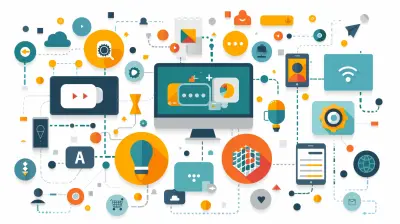Creating Urgency Without Pressuring Prospects
15 August 2025
Ever tried to get someone to act quickly without sounding like a pushy salesperson? It’s a tightrope walk, right? Creating urgency without pressuring prospects is an art and a science. Do it right, and you spark action. Do it wrong, and you scare people away. No one likes to feel cornered—especially not your potential customers.
So how do you give your prospects that little nudge without pushing them off the edge? That’s exactly what we’re unpacking today. This guide dives deep into how to build authentic urgency that motivates — not manipulates.
Let’s break it down step-by-step.
Why Urgency Works (But Pressure Doesn’t)
Let’s start with the elephant in the room: urgency sells. It taps into FOMO — the fear of missing out.But pressure? That’s a whole different beast. It sets off alarm bells. It erodes trust. It makes prospects feel like they’re being chased instead of courted.
You’re not just after a quick sale, right? You want loyal customers. Repeat buyers. Brand advocates. That means building relationships, not just closing deals.
Creating urgency the right way draws your prospects in. It gets them thinking, “I need to look into this now.” Not, “Ugh, I guess I HAVE to buy this now.”
Big difference.
The Psychology Behind Ethical Urgency
People are naturally wired to act when they sense a window of opportunity is closing. We hate missing out – it's practically in our DNA.But here’s the kicker: urgency doesn’t have to come from flashing red countdown timers or all-caps, “ONLY 3 LEFT!!!” headlines.
It can come from:
- A limited opportunity to improve something in their life
- A seasonal solution to a problem they’re currently facing
- New insight that changes how they view their current situation
You’re not manipulating, you’re illuminating. You’re helping them see why waiting could cost them—not in dollars, always—but in opportunity.
1. Start with Their Pain Points
If you really want to create urgency, zoom in on the pain.Not in a cruel way—don’t twist the knife. But show your prospect that their problem isn’t going to fix itself. Paint the picture of what happens if they wait… then paint a brighter one of what happens if they act now.
Let’s say you’re selling a project management tool.
Instead of saying:
> “Buy now—only 20 licenses left!”
Say something like:
> “How many more deadlines do you want to miss before giving your team a better system?”
That hits home. It’s not overt pressure—it’s a prompt. A mirror. It makes them stop and think… and that’s exactly the goal.
2. Use Scarcity — But Be Honest About It
Scarcity is one of the most powerful motivators. It’s why people line up for product drops and why events sell out fast.But here’s the rule: never fake it.
People are smart. If you say you only have 5 items left every time they visit your site, their trust evaporates faster than ice cream under the sun.
Instead, create real scarcity when it exists. If you’re closing your books for client work soon, say so. If your course only opens twice a year, mention it.
Use copy like:
- “Enrollment closes Friday at midnight. After that, the program won’t be available for another 6 months.”
- “We’re only accepting 20 clients this quarter to ensure high-touch service.”
That’s honest. It’s urgent. And it respects the reader.
3. Add a Countdown — But Pair It with Value
Countdown timers aren’t evil. They actually work… when they’re used right.A ticking clock creates natural tension. But when it’s just slapped under a BUY NOW button, it feels gimmicky.
Instead, tie the timer to value. Let it signal the end of something special—not just a random deadline.
Example:
> “Early bird pricing ends in 2 days. After that, the investment goes up by $200.”
Now the countdown isn’t yelling—it's whispering: “Take advantage of this while it lasts.”
Subtle difference. Huge impact.
4. Build Momentum with Micro-Commitments
You don’t always need prospects to leap into a full-blown purchase. Sometimes, what you need is just movement.That’s where micro-commitments come in.
Instead of trying to push someone into a sale, guide them through small yeses:
- Download a free guide
- Watch a quick demo
- Book a discovery call
Each step builds trust. Each yes makes the next easier.
Before you know it, they’re not just ready—they’re eager. And that urgency? You didn’t create it. You uncovered it.
5. Use Storytelling to Highlight Timeliness
Want to show someone why they should act now? Tell a story.Stories are emotional. Relatable. They slip past objections and reach the part of the mind where decisions really happen.
Try this:
> “Last year, Sarah was struggling to grow her business. She waited 6 months before trying our system. Within 3 weeks of finally diving in, she doubled her client list. She told us her only regret? Not starting sooner.”
Boom. That’s urgency without pressure.
It encourages the reader to ask: what would happen if I waited too long?
You didn’t force anything. You showed them what’s possible—and what they risk by waiting.
6. Ask Questions That Stir Action
Ever been asked a question that stopped you in your tracks?Questions are powerful. They shake people out of autopilot and get them thinking.
Use them to subtly raise the stakes:
- “How much longer can you afford to put this off?”
- “What’s the cost of doing nothing?”
- “Will you be in the same place 3 months from now?”
These aren’t accusations. They’re gentle prods—designed to spark reflection and, ultimately, action.
7. Highlight the Cost of Inaction
This is where most businesses drop the ball.They talk about the price of buying—but never mention the price of waiting.
That’s your secret weapon.
We tend to evaluate things based on what we’re paying today. But what about what we’re losing by not acting?
Example:
> “Sure, you can wait to upgrade your website. But how many leads are you losing every day it’s not optimized?”
It doesn’t feel like pressure. It feels like common sense.
You’re not forcing a decision. You’re laying out the stakes.
8. Leverage Social Proof Sparingly (But Smartly)
Nothing creates urgency quite like watching others experience the results you want.Showcase real people who acted—and benefited.
But don’t go overboard. A flood of testimonials can feel staged.
Instead, sprinkle in a few high-impact examples:
- “Mark signed up last week and already booked two new clients.”
- “We’ve had over 300 signups in 48 hours—spots are filling up fast.”
This creates a sense of movement—a current your prospect doesn’t want to miss.
9. Frame Urgency as a Benefit, Not a Threat
Here’s a mindset tweak that changes everything:Urgency isn’t about what they’ll lose—it’s about what they’ll gain sooner.
Instead of framing things negatively:
> “Act now or miss out.”
Try pivoting to:
> “Act now and start seeing results this week.”
Same action. Totally different feeling.
People respond better when they feel hopeful, not scared. When they feel pulled, not pushed.
10. Stay Human — Always
Here’s your golden rule: if it wouldn’t work in a real conversation, don’t use it in your copy.You wouldn’t scream at a friend to “BUY NOW OR ELSE!”—so don’t talk to your audience that way either.
Urgency done right feels like encouragement. Like honesty. Like someone looking out for your best interests.
So be human. Be helpful. Be real.
That’s where the magic happens.
Wrapping Up: Urgency Done Right Builds Trust
At the end of the day, creating urgency without pressure is all about clarity, not coercion.You’re not tricking anyone. You’re guiding them.
You’re helping them make a decision they’ll thank you for—maybe not today, but definitely down the line.
So the next time you're crafting that offer, writing that email, or jumping on that sales call, remember:
You don’t have to push.
You just need to point.
Show them why now matters… and trust them to take the next step.
Bonus: Quick Checklist for Ethical Urgency
Before you hit publish or send, ask yourself:✅ Is this urgency based on a real deadline or scarcity?
✅ Does it highlight benefits more than consequences?
✅ Would this message feel comfortable in a face-to-face conversation?
✅ Am I offering value that justifies the urgency?
✅ Is the pressure internal (from their own goals) or external and artificial?
If you can check all five, you’re golden.
Keep it honest. Keep it human. And watch your conversions rise—without losing sleep at night.
all images in this post were generated using AI tools
Category:
SalesAuthor:

Rosa Gilbert
Discussion
rate this article
1 comments
Bryce Murphy
Creating urgency is essential for conversions, but it’s crucial to balance it with respect for prospects' autonomy.
August 24, 2025 at 10:32 AM

Rosa Gilbert
Absolutely! Balancing urgency with respect for autonomy fosters trust and encourages genuine interest, ultimately leading to more meaningful conversions.


